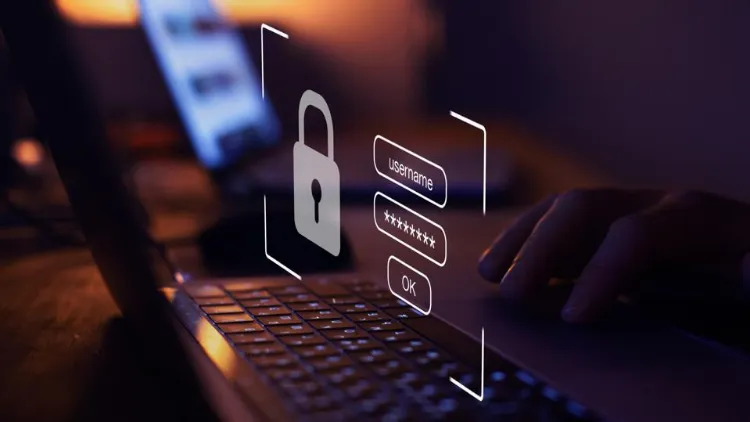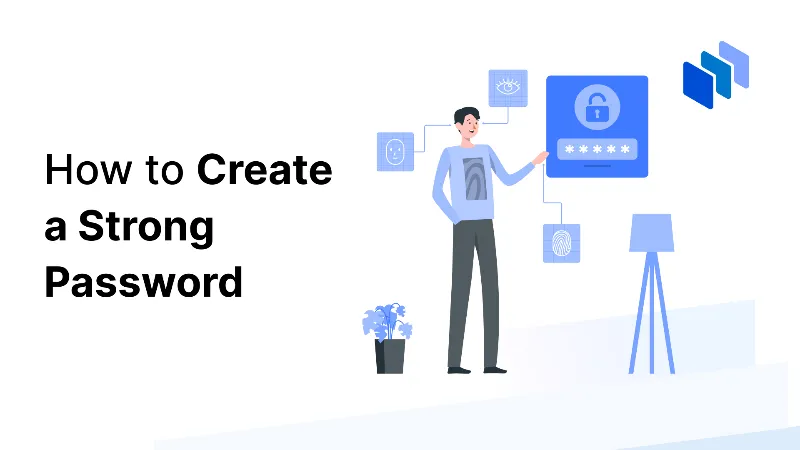Your online accounts have lots of personal info, making them a target for hackers. But, you can easily improve your online safety and protect your identity by using Strong Passwords.
This article will show you how to make secure passwords and keep your online life safe. We’ll talk about why strong passwords are important, how to make them, and the benefits of using password managers and biometric authentication. By the end, you’ll know how to keep your accounts safe from unauthorized access.
Are you ready to boost your password security and take back control of your digital identity? Let’s start and learn how to make passwords that hackers can’t break into. Your online accounts will be much safer.
The Significance of Strong Passwords
Strong passwords protect your online identity and keep your accounts safe from unauthorized access. Weak or reused passwords make you an easy target for cyber threats like password guessing and credential stuffing attacks. It’s key to use strong passwords to keep your personal and financial info safe.
Protecting Your Online Identity
Your online identity shows who you are online. Strong passwords are crucial for keeping your password-based security strong. They help protect your personal and sensitive data from others.
Preventing Unauthorized Access
Weak passwords can be easily guessed, letting malicious actors into your accounts. This can lead to stolen personal and financial info, or even the takeover of your digital assets. Using strong, unique passwords for all accounts lowers the risk of password breaches and keeps your online life secure.
Strong passwords are very important. Taking the time to create a good password strategy is key to protecting your online identity and keeping your accounts safe from unauthorized access.
How to Create Strong Passwords

Making strong, unique passwords is key in today’s digital world. It’s vital to follow modern password length requirements and complexity guidelines. Experts say your passwords should be at least 16 characters long. They should also avoid sequential numbers, birthdays, names, or dictionary words.
A good password is a mix of uppercase and lowercase letters, numbers, and symbols. By doing this, you make your digital identity much safer. This helps stop others from getting into your accounts without permission.
Avoiding Common Password Mistakes
It’s also important to avoid common password mistakes that can hurt your online security. Don’t use personal info, reuse passwords, or follow easy patterns.
- Don’t use your name, birthdate, or pet’s name in your passwords.
- Never use the same password for more than one account. This makes you more vulnerable to attacks.
- Avoid easy patterns like sequential numbers or typing patterns (like “qwerty”).
By keeping these tips in mind, you can make strong, unique passwords. These will protect your digital stuff and personal info.
Must Read : Build a Smart Home on a Budget: Easy Tips & Tricks
Unique Passwords for Every Account
Using unique passwords for each online account is key to keeping your info safe. If you use the same password for many sites, hackers can get into all your accounts if they crack one password. That’s why it’s smart to have unique, complex passwords for every site. Password management tools can really help with this.
Creating a unique password for every account might seem hard, but it’s very important. It helps keep your online identity safe and stops others from getting into your accounts. Using this password management strategy lowers the risk of your passwords being shared by others.
The Role of Password Managers
Password managers are key for making and keeping complex, unique passwords for all your online accounts. They can make strong, random passwords that follow the best standards. By keeping your login info in an encrypted safe, they make it easy to forget less passwords, cutting down the chance of using the same weak password over and over.
This way of handling passwords can really boost your security.
Generating Strong Passwords
Password managers are great at making secure, random passwords. These passwords are longer and more complex than what most people would think of. They mix uppercase and lowercase letters, numbers, and special characters, making them hard to crack.
Securely Storing Credentials
Your login details are kept safe in an encrypted vault by password managers. This means your info is safe even if your device gets lost or stolen. You don’t have to remember or write down many passwords because the manager fills them in for you.
Many also offer extra security like two-factor authentication and biometric login. This makes your stored info even safer.
Using a password manager makes handling passwords easier, creates stronger ones, and keeps your online accounts safe. It’s a great addition to your cybersecurity plan, helping protect your digital identity and important info.
Password Security Techniques
Creating strong, unique passwords is just the start. Adding more security steps can really help protect your online accounts. Enabling two-factor authentication is a key move. It adds an extra check to make sure only you can get in.
It’s also smart to update your passwords often, even if there’s no known issue. This keeps you safe from hackers who might use old passwords they’ve found. Updating your passwords regularly is a top way to stay secure online.
Enabling Two-Factor Authentication
Two-factor authentication (2FA) makes logging in more secure. After your password, you’ll need another code. This could be on your phone or from an app. So, even if hackers get your password, they can’t get into your account.
Updating Passwords Regularly
Changing your passwords often is key to keeping your accounts safe. This is true even if there’s no known problem. By doing this, you make any leaked passwords useless fast. Try to change your passwords every few months for the best security.
Biometric Authentication: The Future of Passwords?
Technology is changing fast, bringing us new ways to keep things safe and easy. Biometric authentication, like using your fingerprint or face, is becoming a top choice over old-school passwords.
Fingerprint and Facial Recognition
Biometric authentication uses your unique traits, like your fingerprints or face, to check who you are. It’s better than passwords because you don’t need to remember hard-to-remember codes. It also makes it harder for others to get into your stuff.
Limitations of Biometric Authentication
Biometric authentication adds an extra layer of safety, but it’s not perfect. If someone gets your biometric data, it’s a big problem. Also, new tech like high-quality masks and deepfakes might trick these systems.
So, it’s smart to use both strong passwords and biometric checks for the best online security. This mix helps protect against the downsides of biometric tech and keeps your digital world safe.
5 Tools to Generate Secure Passwords
Making strong, unique passwords is key to keeping your online accounts safe. I’ve found five top password generator tools to help you easily make secure passwords.
- LastPass Password Generator – This free tool makes complex, random passwords just for you.
- 1Password Password Generator – With a single click, this tool creates long, secure passwords for you.
- KeePass Password Generator – This open-source tool lets you customize your passwords with various options.
- Bitwarden Password Generator – It’s easy to use and makes strong, unique passwords for all your accounts.
- Password Generator by NordPass – Made by NordVPN, this tool creates super secure passwords and manages them for you.
Using these password generator tools, password creation software, and secure password management methods helps protect your online identity. It also stops unauthorized access to your accounts.
The Dangers of Password Reuse
In today’s digital world, using the same password for many accounts is risky. This makes you an easy target for cybercriminals who use stolen login info on different websites. They do this through credential stuffing attacks.
More than half of internet users reuse passwords across sites. This is dangerous because big data breaches can expose millions of usernames and passwords. Hackers can then quickly try these on thousands of websites, gaining access to your accounts. This could lead to stolen data, money loss, and identity theft.
Credential Stuffing Attacks
Cybercriminals use stolen login info to try accessing websites in a big way. They hope some will work, which can lead to all your accounts being hacked if you reuse passwords. This kind of attack is very dangerous.
The Importance of Unique Passwords
Using different, strong passwords for each online account is key to avoiding password reuse risks. This stops cybercriminals from getting into your accounts. By having a unique password for each account, you limit the damage if your info gets leaked.
Using a password manager to keep track of complex, unique passwords is a smart move. It helps protect your online identity from password reuse risks and credential stuffing attacks, which can be very harmful.
Social Media and Password Security
Social media is a big part of our lives today. But, it can also be a risk to our password security and privacy. Sharing too much personal info, like birthdays or pet names, can make it easier for hackers to guess our passwords.
Avoiding Oversharing Online
Cybercriminals can use what you share on social media to guess your passwords. It’s important to think about what you post. Avoid sharing info that could make your passwords or privacy at risk.
Protecting Your Privacy
Social media companies collect and share a lot of data, which can risk your privacy. Your online actions and login info might be shared with others, putting your digital security at risk. To protect your privacy, check your social media privacy settings often and share less personal info.
Being careful about what you share on social media helps protect your password security. Keeping an eye on your online presence is key in today’s connected world.
Wrap Up
Making and keeping strong, unique passwords is key to protecting your online identity and personal info. This article has shown you how to create a strong password security plan. It includes making complex passwords, using password managers, two-factor authentication, and being careful with social media.
By following these tips, you can keep your accounts safe from hackers and cyber threats. This ensures the safety of your digital life.
Think about using tools like LastPass, 1Password, and KeePass to help manage your passwords. Sites like PassGen and PasswordGenerator.org can also help you make strong passwords for each account. Adding these strategies and tools to your online habits will boost your password security.
Strong passwords are very important. They protect you from identity theft and unauthorized access to your accounts. By focusing on password security, you’re protecting your digital life and keeping your online activities private.


